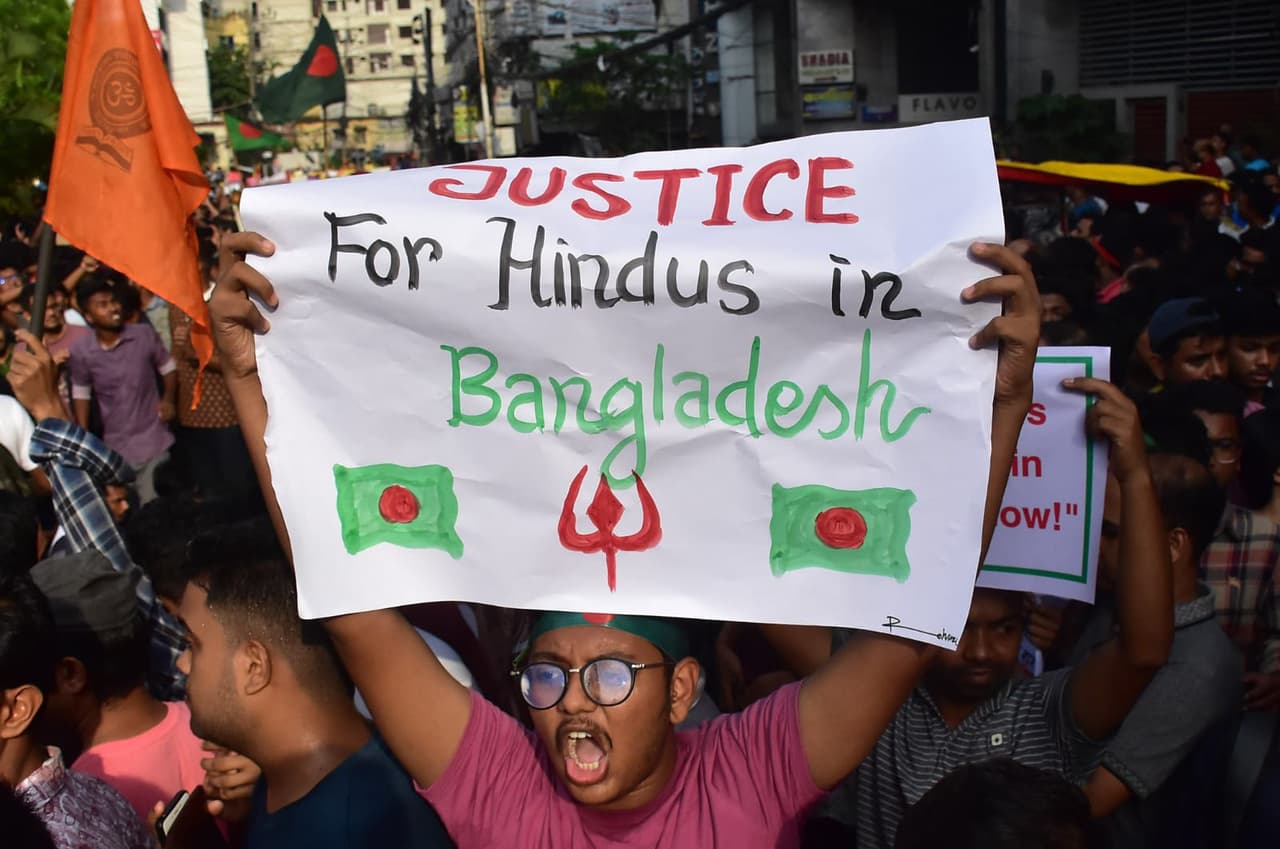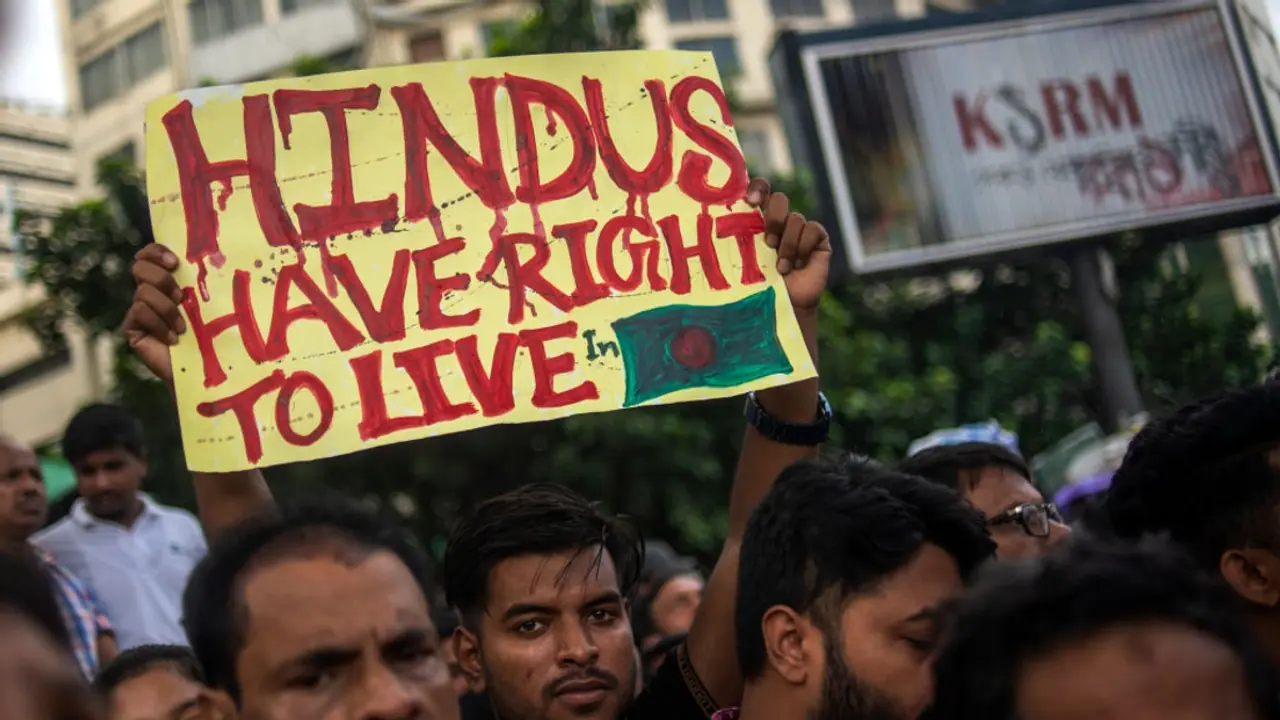The current crisis in Bangladesh has intensified concerns about religious intolerance and foreign interference, while India’s strategies to safeguard its stability are being closely scrutinized.
As Bangladesh grapples with escalating violence against Hindu minorities and widespread unrest following the resignation of Prime Minister Sheikh Hasina, experts are drawing comparisons with India’s proactive measures to prevent similar destabilization. The current crisis in Bangladesh has intensified concerns about religious intolerance and foreign interference, while India’s strategies to safeguard its stability are being closely scrutinized.

Attack on Hindu minorities in Bangladesh: An expert analysis
Recent reports reveal a troubling pattern of targeted violence against Hindu communities in Bangladesh, marked by attacks on temples, businesses, and homes. According to Pramit Pal Chaudhuri, a renowned expert on foreign policy and political economy, these incidents are not isolated but rather indicative of a persistent and troubling pattern.
Chaudhuri emphasizes that the targeted attacks against Hindus in Bangladesh have historical roots dating back to 1971, when the Pakistani military perpetrated widespread atrocities against the Bengali population, including the intellectual class. This dark chapter of history has left a lingering impact, fueling current tensions and unrest.
The expert draws a parallel between the systematic targeting of Hindus today and the tactics used during the 1971 genocide. He explains that the violence is driven by both political and religious motivations. On one hand, groups like Jamaat-e-Islami and other Islamic factions, which have long opposed the presence of non-Muslim minorities in Bangladesh, are believed to be behind many of these attacks. On the other hand, political rivalries, particularly between the ruling Awami League and opposition groups, have also contributed to the violence. The Awami League's strong minority support base has made its Hindu members targets of political revenge.

Chaudhuri notes that the violence has escalated in the context of a fragile political situation. The interim government in Bangladesh is struggling to maintain law and order, with reports of police strikes and lawlessness in various regions. This instability has created a vacuum that anti-social elements have exploited to perpetrate violence against minorities.
Recommendations for Action:
International Awareness: Chaudhuri highlights the importance of raising international awareness about the situation. India, the United Nations, and the U.S. State Department have all voiced concerns, but sustained global pressure is needed to address the crisis effectively.
Restoring Stability: Restoring order and stability in Bangladesh is crucial. The interim government must prioritize reestablishing law and order to prevent further violence.
Engaging with a Stable Government: Once a stable government is in place, it will be easier for the international community to apply pressure and persuade it to take meaningful action against the perpetrators of violence.
Economic Leverage: In the extreme scenario where radical groups gain significant power, the international community might consider economic measures, such as restricting exports, to compel action. However, Chaudhuri warns that such measures could lead to further instability, which would be undesirable.
India's proactive measures to prevent destabilization
In contrast to the situation in Bangladesh, India has successfully navigated complex geopolitical challenges to prevent similar destabilization. The Indian government has implemented several proactive measures to thwart potential foreign plots and safeguard national stability.
Union Home Minister Amit Shah recently announced the formation of a high-level committee, led by the Additional Director General (ADG) of the Border Security Force (BSF) and the Eastern Command of the Indian Army. This committee will collaborate with Bangladeshi authorities to monitor and secure the India-Bangladesh border, focusing on protecting Indian nationals and minority communities from potential threats.
In a recent assessment, Abhijit Iyer-Mitra, Senior Fellow at the Institute of Peace and Conflict Studies (IPCS), lauded India’s approach to managing external threats and its economic stability under the current administration. Iyer-Mitra emphasized that India’s robust foreign policy and strict regulation of foreign NGO funding have been instrumental in countering potential damage from external actors. He noted that groups like Omidyar and Hindenburg have been critical of India due to their vested interests, but the government’s firm stance has mitigated their influence.

He elaborated on the complexity of India's geopolitical landscape, contrasting it with countries like Ukraine and Bangladesh. Iyer-Mitra highlighted that while European countries and Ukraine may align closely with American interests, India's historical experiences and diverse internal landscape pose different challenges. He criticized the American diplomatic approach for being elitist and not fully engaging with the broader spectrum of Indian society.
Iyer-Mitra also pointed out that India's foreign policy has been reactive rather than proactive in some areas. He suggested that more aggressive measures, such as sanctions against influential foreign entities, could further safeguard against external influences.
On the economic front, Iyer-Mitra commended the Indian government for its effective management. He attributed the country’s resilience to its non-export-dependent economy and stringent regulatory powers, which have helped prevent market disruptions. The government’s actions against foreign entities like Soros, Omidyar, and Hindenburg were highlighted as key to maintaining economic stability.
Iyer-Mitra acknowledged that while there have been significant achievements, India’s approach has been largely defensive. He suggested that more proactive measures could be taken to counter foreign influence, including stricter regulations on foreign funding in media.
Addressing India’s regional relations, Iyer-Mitra praised the current administration for effectively navigating tensions with Pakistan and China. He highlighted the administration’s focus on infrastructure development along the border and improved defense mechanisms as critical steps in managing these challenges.
He contrasted India’s approach with Pakistan’s historical pattern of political instability and criticized the ongoing territorial disputes with China. Despite ongoing challenges, Iyer-Mitra believes that India is making significant progress toward its strategic goals.
Iyer-Mitra’s insights suggest that while India has managed to avoid descending into chaos, there are areas for improvement. He emphasized the need for proactive measures in handling unauthorized demonstrations and riots. Drawing a parallel with Bangladesh’s recent history, he suggested that early intervention is crucial to preventing larger-scale unrest.
